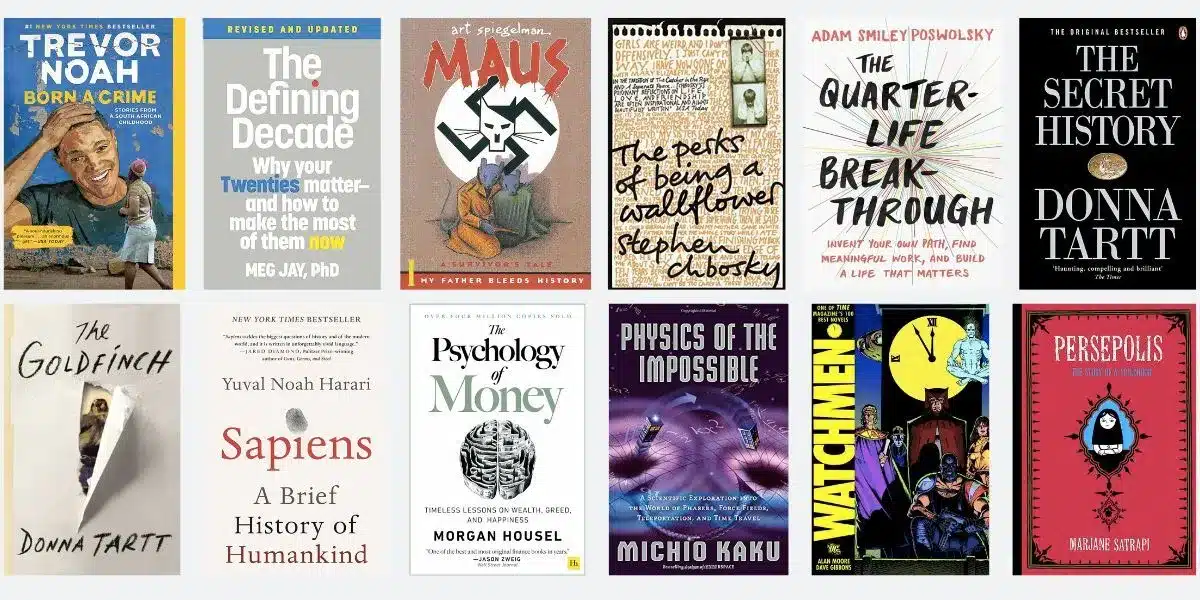Books are powerful tools that provide insight, expand understanding, and inspire growth. Informative books cover a wide range of topics. They include science, history, technology, and philosophy. They help readers learn about the world and gain knowledge. They challenge readers’ views in practical, thought-provoking ways. The best informative books can be a great resource. They’re useful for both curious readers and professionals seeking expertise. Below, we highlight ten of the most engaging and educational books. Each is chosen for its depth, clarity, and relevance. This ensures you can explore new ideas with ease.
Top 10 Best Informative Books
- Sapiens: A Brief History of Humankind by Yuval Noah Harari
- Factfulness: Ten Reasons We’re Wrong About the World—and Why Things Are Better Than You Think by Hans Rosling
- A Short History of Nearly Everything by Bill Bryson
- The Immortal Life of Henrietta Lacks by Rebecca Skloot
- The Selfish Gene by Richard Dawkins
- Homo Deus: A Brief History of Tomorrow by Yuval Noah Harari
- Guns, Germs, and Steel: The Fates of Human Societies by Jared Diamond
- Thinking, Fast and Slow by Daniel Kahneman
- The Body: A Guide for Occupants by Bill Bryson
- Cosmos by Carl Sagan
Sapiens: A Brief History of Humankind by Yuval Noah Harari
This book takes readers on a journey through human history, covering the rise of Homo sapiens to the modern age. Harari explores how biology, culture, and technology have shaped society. Sapiens stands out as one of the Best Educational Leadership Books for understanding the broader context of human development, offering clear, simple language to explain complex ideas in an accessible way.
Key Highlights:
- Explores pivotal moments in human evolution.
- Discusses the impact of agricultural and scientific revolutions.
- Offers a broad perspective on the interconnectedness of history and humanity.
Factfulness: Ten Reasons We’re Wrong About the World—and Why Things Are Better Than You Think by Hans Rosling
Rosling challenges common misconceptions about the world with data-driven insights. This book explains why many are pessimistic about global trends. It offers a more accurate, optimistic view. It includes practical tools to think critically and interpret information effectively.
Key Highlights:
- Focuses on fact-based thinking and critical analysis.
- Provides data that dispels myths about poverty, health, and development.
- Encourages readers to base opinions on evidence, not assumptions.
A Short History of Nearly Everything by Bill Bryson
Bryson tackles the biggest questions in science with wit and curiosity. He explains complex topics like geology, physics, and biology in simple, engaging language. This book is a must-read for anyone who wants to understand the science behind the world around us.
Key Highlights:
- Breaks down complicated scientific concepts into easy-to-digest explanations.
- Covers topics from the Big Bang to human evolution.
- Combines humor and knowledge for an enjoyable reading experience.
The Immortal Life of Henrietta Lacks by Rebecca Skloot
This story is about Henrietta Lacks. Her cells (HeLa) were used in medical research, without her knowledge. Skloot weaves together science, ethics, and personal stories. The result is a powerful, informative book.
Key Highlights:
- Explores medical ethics and the history of scientific research.
- Highlights the personal impact of scientific progress.
- Combines storytelling with factual information to engage readers.
The Selfish Gene by Richard Dawkins
This book revolutionized how we think about evolution and natural selection. Dawkins explains the gene-centered view of evolution. It says genes drive behavior and development. Written for a broad audience, it’s both informative and accessible.
Key Highlights:
- Explains evolution from a genetic perspective.
- Discusses concepts like altruism, competition, and survival.
- Simplifies complex biological theories for non-experts.
Homo Deus: A Brief History of Tomorrow by Yuval Noah Harari
A follow-up to Sapiens, this book explores humanity’s future. Harari examines how technology, AI, and genetic engineering may shape society in the future. It’s a fascinating look at possibilities and challenges.
Key Highlights:
- Predicts future trends in technology and society.
- Explores ethical questions surrounding AI and biotechnology.
- Provides a broad view of humanity’s potential trajectory.
Guns, Germs, and Steel: The Fates of Human Societies by Jared Diamond
Diamond examines how geography and environmental factors have influenced the development of civilizations. The book explains why some societies advanced faster than others. It dives deep into history and culture.
Key Highlights:
- Explores the impact of geography, agriculture, and technology on history.
- Challenges simplistic views of cultural development.
- Offers a scientific perspective on human progress.
Thinking, Fast and Slow by Daniel Kahneman
Nobel laureate Daniel Kahneman explores how humans think and make decisions. He introduces two modes of thinking: fast, intuitive thinking and slow, analytical reasoning. The book offers insights into human behavior and decision-making processes.
Key Highlights:
- Explains cognitive biases and their effects on decision-making.
- Provides practical tools to improve reasoning and judgment.
- Combines psychology and economics for a unique perspective.
The Body: A Guide for Occupants by Bill Bryson
Bryson explores the human body in this entertaining and informative book. He explains how the body works, from cells to organs, with his signature humor and clarity. This book is perfect for anyone curious about human biology.
Key Highlights:
- Covers a wide range of topics related to human anatomy and physiology.
- Presents science in an engaging, reader-friendly format.
- Includes fascinating trivia and lesser-known facts.
Cosmos by Carl Sagan
A classic in science literature, Cosmos explores the universe. Sagan explains topics like astronomy, the origins of life, and humanity’s place in the cosmos. His poetic writing style makes this an inspiring read.
Key Highlights:
- Explains complex scientific ideas with clarity and beauty.
- Encourages a sense of wonder about the universe.
- Combines science, philosophy, and storytelling seamlessly.
Frequently Asked Questions
Why should I read informative books?
Informative books expand your knowledge and challenge your views. They also provide tools for personal and professional growth.
Which book is best for beginners?
A Short History of Nearly Everything by Bill Bryson is a great choice for beginners. It covers many topics in an easy-to-read style.
Can I use these books for academic purposes?
Yes, many, like The Selfish Gene and Thinking, Fast and Slow, are well-regarded in academia. They offer valuable insights.
Are these books suitable for young readers?
Books like Sapiens and Cosmos suit young adults who like science or history. Others may require a more advanced reading level.
Conclusion
The best informative books do more than share facts. They inspire curiosity and a deeper understanding of the world. These ten books hold a wealth of knowledge. They explore history, science, and human behavior. These books will inform and inspire you. They will help you grow, provide academic insights, or just entertain you. Dive into these timeless works to expand your horizons and discover the joy of learning!

